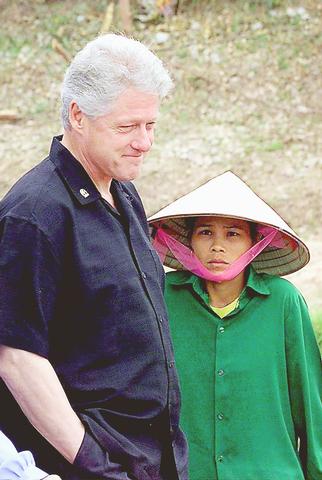Of US President Bill Clinton's many objectives in visiting Vietnam, a key one is to try to dispel the ugly images of the Vietnam War and to offer Americans a new vision of the country that defeated them.
For many Americans, the Vietnam war is summarized by a few awful pictures: a Vietnamese girl burned by napalm running naked and screaming down a village road or helicopters packed to the gills as they abandoned Saigon in 1975.

PHOTO: AFP
Clinton, the first US president to visit Vietnam since the war ended a quarter century ago, has sought to bring to light another reality: a burgeoning country of people most of whom are too young to remember the conflict.
"Finally, America is coming to see Vietnam as your people have asked for years -- as a country, not a war," he told student's at Hanoi University on Friday in an unprecedented live televised address to the Vietnamese people.
Clinton has himself tried to get a taste of Vietnam, spending close to an hour in a tiny Hanoi art gallery on Saturday and emerging to cries of wonder and delight from throngs of Vietnamese packed into a narrow shopping street.
"The old images of the war are never going to disappear. They are part of our history and should not disappear," said Mitchell Hall, a professor of history at Central Michigan University.
"But just as we have been able to shed our wartime attitudes toward Great Britain, Mexico, Germany and Japan, I think it is also possible and I would argue necessary for us to move beyond our wartime attitude toward Vietnam," he said.
Clinton, who opposed and avoided the Vietnam War, has taken dramatic steps to reconcile with the country, ending the punitive US trade embargo in 1994 and normalizing ties a year later.
Historians and political analysts said that, to persuade the American people to support the policy, he needed to try to exorcise the war's demons from their minds.
"One of the difficulties is that the average [American] has no current perception of Vietnam," said Jeff Kaplan, an international affairs fellow at the New York-based Council on Foreign Relations.
"You had the war ... but so far there hasn't been any new engagement to replace those images from the past," he added.

FREEDOM OF NAVIGATION: The UK would continue to reinforce ties with Taiwan ‘in a wide range of areas’ as a part of a ‘strong unofficial relationship,’ a paper said The UK plans to conduct more freedom of navigation operations in the Taiwan Strait and the South China Sea, British Secretary of State for Foreign, Commonwealth and Development Affairs David Lammy told the British House of Commons on Tuesday. British Member of Parliament Desmond Swayne said that the Royal Navy’s HMS Spey had passed through the Taiwan Strait “in pursuit of vital international freedom of navigation in the South China Sea.” Swayne asked Lammy whether he agreed that it was “proper and lawful” to do so, and if the UK would continue to carry out similar operations. Lammy replied “yes” to both questions. The

‘OF COURSE A COUNTRY’: The president outlined that Taiwan has all the necessary features of a nation, including citizens, land, government and sovereignty President William Lai (賴清德) discussed the meaning of “nation” during a speech in New Taipei City last night, emphasizing that Taiwan is a country as he condemned China’s misinterpretation of UN Resolution 2758. The speech was the first in a series of 10 that Lai is scheduled to give across Taiwan. It is the responsibility of Taiwanese citizens to stand united to defend their national sovereignty, democracy, liberty, way of life and the future of the next generation, Lai said. This is the most important legacy the people of this era could pass on to future generations, he said. Lai went on to discuss

AMENDMENT: Climate change is expected to increase the frequency of high-temperature days, affecting economic productivity and public health, experts said The Central Weather Administration (CWA) is considering amending the Meteorological Act (氣象法) to classify “high temperatures” as “hazardous weather,” providing a legal basis for work or school closures due to extreme heat. CWA Administrator Lu Kuo-chen (呂國臣) yesterday said the agency plans to submit the proposed amendments to the Executive Yuan for review in the fourth quarter this year. The CWA has been monitoring high-temperature trends for an extended period, and the agency contributes scientific data to the recently established High Temperature Response Alliance led by the Ministry of Environment, Lu said. The data include temperature, humidity, radiation intensity and ambient wind,

SECOND SPEECH: All political parties should work together to defend democracy, protect Taiwan and resist the CCP, despite their differences, the president said President William Lai (賴清德) yesterday discussed how pro-Taiwan and pro-Republic of China (ROC) groups can agree to maintain solidarity on the issue of protecting Taiwan and resisting the Chinese Communist Party (CCP). The talk, delivered last night at Taoyuan’s Hakka Youth Association, was the second in a series of 10 that Lai is scheduled to give across Taiwan. Citing Taiwanese democracy pioneer Chiang Wei-shui’s (蔣渭水) slogan that solidarity brings strength, Lai said it was a call for political parties to find consensus amid disagreements on behalf of bettering the nation. All political parties should work together to defend democracy, protect Taiwan and resist